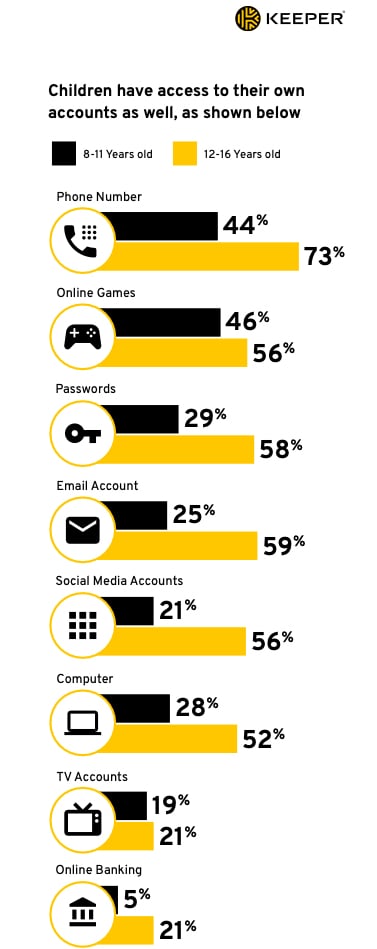Cyber Hygiene is more than strong passwords
In today's digital age, the landscape of childhood has undergone a profound transformation. A recent survey by Keeper, a password security app company, reveals that a staggering 44% of 8-11-year-old children now possess their own phone numbers and online gaming accounts. This percentage rises to nearly 70% among 12-16-year-olds as they become more tech-savvy. While technology's evolution is undeniable, it raises critical questions about our children's safety and security.
This survey, conducted among 4000 parents in the UK, US, France, and Germany, sheds light on issues parents worldwide are grappling with. Many parents readily share their devices, account logins, passwords, and even social media accounts with their children. Unfortunately, some parents lack the knowledge to create strong passwords, yet they grant their children access to their digital lives without adequate protection. Moreover, discussions about online security often remain unaddressed, with approximately one-third of parents never broaching the topic with their children. Some parents are uncertain about whether the responsibility for cybersecurity education lies with them or the school system.

While the study mainly emphasized password security due to its origin in a password management company, the results highlight a more profound issue: the urgent need for comprehensive cybersecurity education for children. Instilling cyber safety habits and cyber hygiene in children is a substantial task, one that requires extensive discussion and proactive measures.
Firstly, we must clarify what cybersecurity entails. Cybersecurity encompasses more than just password protection. We need to answer questions like, "What does it involve? What isn't cybersecurity? How do we determine what to teach, and who is best equipped to do it?" Answering these questions is essential to ensuring children's cyber safety in the digital world, rather than merely imparting digital skills they may already possess or teaching irrelevant skills.
Secondly, conversations between parents and children about online safety often focus on topics like cyberbullying and the dangers of online predators.. It’s a conversation I often have with my children. These are critical discussions that all parents should have with their children. However, hacking is a different, more complex issue that most adults struggle to grasp fully. They lack an understanding of how hacking works and how it can be exploited to target unsuspecting children. Even highly computer-savvy adults with advanced degrees in cybersecurity—many of whom I have trained in cybersecurity awareness—fall short. Most parents are ill-equipped to teach their children about the complexities of cybersecurity, often creating fear rather than instilling rational knowledge.
Thirdly, relying solely on warnings or fear-based approaches is not the solution. Many school prevent technology access, and most parents drive children with fear. These work just as much as those “deer crossing” signs that all of us wiz by on interstate roads in United States without so much as slowing down. Or the drink responsibly or stark anti-smoking commercials showing cigarette smokers dying of cancer—that many young people ignore.
To address this issue, we must shift our focus from fear to understanding and action. Cyber safety is not solely about cautionary tales or warnings. It is about instilling healthy cyber hygiene habits and empowering children with the knowledge they need to navigate the digital world safely. While password hygiene is a crucial component, it represents just one facet of the larger cybersecurity story.
At the Cyber Hygiene Academy, we understand that effective education goes beyond dry lectures or fear-based campaigns. We've harnessed the power of the Cyber Hygiene Inventory, a comprehensive tool designed to assess children's cyber hygiene needs. With this knowledge as our foundation, we are crafting training and educational programs that cover all aspects of cyber safety. Our approach is not only informative but also engaging, compelling, and tailored to individual needs.
What is particularly striking is the level of access children have to technology. In the United States, most children participate in routine lockdown drills and fire safety exercises, preparing for unlikely events. Statistically speaking, the chances of encountering a cyber attack are far higher than those of facing a school shooter. Yet, our children remain ill-prepared to resist digital threats.
 The Cyber Hygiene Academy seeks to bridge this gap by equipping our children with the tools and knowledge they need to thrive in an increasingly connected world. Our mission is to ensure that they can navigate the digital landscape safely, confidently, and responsibly. We aim to provide the education and tools necessary not only to safeguard our children's online experiences but also to prepare them for careers in the growing field of cybersecurity. With our holistic approach, we empower the next generation to thrive in the digital age while staying protected against evolving cyber threats. It's time to unlock a brighter, safer future for our children, and the Cyber Hygiene Academy is leading the way.
The Cyber Hygiene Academy seeks to bridge this gap by equipping our children with the tools and knowledge they need to thrive in an increasingly connected world. Our mission is to ensure that they can navigate the digital landscape safely, confidently, and responsibly. We aim to provide the education and tools necessary not only to safeguard our children's online experiences but also to prepare them for careers in the growing field of cybersecurity. With our holistic approach, we empower the next generation to thrive in the digital age while staying protected against evolving cyber threats. It's time to unlock a brighter, safer future for our children, and the Cyber Hygiene Academy is leading the way.
Join us in this vital mission today. Let's secure our children's future in the digital world. If you want to share your thoughts on how we can achieve cyber hygiene in K-12, fill this out.




